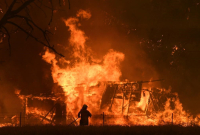Support strong Canadian climate journalism for 2025
This story was originally published by The Guardian and appears here as part of the Climate Desk collaboration
Climate breakdown played a key role in at least 15 events in 2019 that cost more than $1bn in damage, with more than half of those costing more than $10bn each.
Extreme weather including floods, storms, droughts and wildfires struck every inhabited continent in the past year, causing devastation and loss of life. Christian Aid, which tracked climate-related destruction in 2019, said the costs in human terms and insured losses were likely to have been underestimated.
Floods in Argentina and Uruguay in January this year forced 11,000 people from their homes. Cyclone Idai killed 1,300 people in Zimbabwe, Mozambique and Malawi in March, and Cyclone Fani struck India and Bangladesh in May and June. A stronger than usual monsoon killed 1,900 people in India.
Richer countries were also badly affected, with Storm Eberhard hitting Europe in March and the typhoons Faxai and Hagibis battering Japan in September and October, disrupting the Rugby World Cup. Wildfires laid waste to farming areas in California and caused more than $25bn in damage, and Hurricane Dorian swept along the US east coast, killing 673 people.
The study published on Friday was compiled before the full effects of the Australian wildfires could be assessed.
Kat Kramer, a co-author of the report and the global climate lead at Christian Aid, said time was running out to tackle the climate crisis.
“Last year, [greenhouse gas] emissions continued to rise, so it’s essential that nations prepare new and enhanced pledges for action to [fulfil] the Paris agreement as soon as possible,” she said. “That will ensure the world responds urgently to the warnings of scientists, as well as the demands from schoolchildren around the globe who are horrified at the kind of world they are being forced to inherit.”
Hurricane Dorian caused at least $11bn in losses, and floods in the midwest and south of the US from March to June cost about $12.5bn. India’s losses from floods and Cyclone Fani alone came to more than $18bn, and these estimates covered only insured losses. Typhoon Lekima in China was estimated to have cost at least $10bn, and floods in China from June to August cost a similar amount.
Experts said the extreme weather and record-breaking temperatures were clearly linked to human actions.
Michael Mann, the director of the Earth System Science Center at Pennsylvania State University, said: “If anything, 2019 saw even more profound extreme weather events around the world than last year, including wildfires from the Amazon to the Arctic, and devastating out-of-season simultaneous wildfires in California and Australia, winter heatwaves and devastating superstorms.
“With each day now, we are seemingly reminded of the cost of climate inaction in the form of ever-threatening climate change-spiked weather extremes.”
Governments failed to make much progress at the UN climate talks in Madrid earlier this month, but campaigners hope the public concern and activism around the world, as well as reminders of the vast and growing economic and social costs of inaction, will act as a spur.
Nations will meet in Glasgow in early November to update their plans under the Paris accord, which binds them to take action to ensure global temperature rises do not exceed 2C above pre-industrial levels.



![Sgt. Jose Paiz and Staff Sgt. Michael Aguilar both of the 1114th Composite Truck Company, California National Guard, guide a woman through thick knee-deep mud Jan. 12, 2018, from Montecito, Calif. Photo by: California National Guard. Flickr [(CC BY- 2.0)]](/sites/default/files/styles/article_card_keep_reading_sm_1x/public/img/2019/12/19/38863174625_8815d13271_c_0.jpg.jpeg?itok=MeilRmj1)


Comments